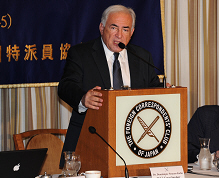
Typical street scene in Santa Ana, El Salvador. (Photo: iStock)
IMF Survey: IMF Head Warns of Threats to Recovery, Stimulus Still Needed
January 18, 2010
- World economy recovering faster than expected but still fragile
- Emerging Asia, including China and India, leading the way
- Risks include growth of asset bubbles in emerging economies
The global economy is recovering from the international financial crisis faster than expected, but IMF Managing Director Dominique Strauss-Kahn warned that growth was still largely driven by government stimulus measures and countries risked a return to recession if anti-crisis measures are withdrawn too soon.

Strauss-Kahn speaking to reporters at the Tokyo Foreign Correspondents Club. He warned of the risks to recovery. (photo: IMF)
Strauss-Kahn in Tokyo
Speaking on a trip to Asia, which is leading the recovery, Strauss-Kahn identified several key concerns.
• Unemployment is still growing, posing the threat of social unrest and even conflict if not tackled.
• The risk appetite of investors is on the rise. While investors are still not putting capital into advanced economies, large sums are flowing into emerging economies, including Russia, Brazil, and emerging Asia, creating the risk both of asset bubbles or of a damaging abrupt halt in inflows.
• The financial system remains damaged. Japan's experience with its own financial crisis since the late 1990s shows that recovery begins only when companies and banks have cleaned up their balance sheets.
• The timing of unwinding of government stimulus measures is crucial. Although governments are now saddled with high debts from the anti-crisis measures, trying to remove the stimulus measures too quickly could result in a “double dip” recession, with advanced economies in particular falling back into negative growth.
Private demand still weak
Speaking at the Tokyo Foreign Correspondents Club on January 18, Strauss-Kahn said the world was seeing a multispeed recovery, with different countries emerging from the crisis at different rates. He said the IMF would release its quarterly growth forecast shortly showing a faster recovery than expected.
Emerging markets, particularly in Asia, were leading the recovery, but advanced economies were still gaining ground more quickly than anticipated earlier. However, the recovery is fragile and growth, particularly in advanced economies, remains dependent of government stimulus measures.
“Our forecast at the IMF is not a forecast of a double dip. But you never know. It may happen and especially if countries exit too early. If they exit too early and we have a new downturn in growth, then really I don’t know what we can do. A lot of our toolkit in terms of fiscal and monetary policy has been used. If we fall back into negative territory for growth it will be very, very difficult to solve the problem, So, our advice is to be very careful,” the Managing Director cautioned.
“The best indicator (for the exit timing) is private demand and employment ... In most countries, growth is still supported by government policies. For as long as you do not have private demand strong enough to offset the need of public policy, you shouldn't exit," he said.
Strauss-Kahn is visiting the region as part of enhanced engagement with Asia by the Fund. The IMF and the Government of Korea are planning a high level regional conference in Seoul for July.
Focus for 2010
Strauss-Kahn said the focus in coming months should be on
• Building a sustainable recovery. Governments should use stimulus measures to help create jobs and combat unemployment. Joblessness was a threat to democracy and could lead to social unrest and even war. “When we are working to try to achieve economic and financial stability, what is at stake is not only dry figures on a piece of paper. It’s the whole stability of the world that is at stake, and that’s why sustainable recovery goes much further than only the rate of growth.”
• Addressing the roots of the crisis. Lax supervision and regulation of financial markets was an underlying cause of the crisis. The financial sector cannot return to business as usual, and governments must not abandon financial sector reform just because recovery is under way.
• Forging global cooperation. Governments should build on the global cooperation that developed during the crisis. The IMF is providing analytical support for the mutual assessment process initiated by the leaders of the Group of Twenty (G-20) and will present a paper to finance ministers at their April meeting. Strauss-Kahn said this would be very important for the future of the world economy. “It acknowledges that we are truly in a globalized world… There is no domestic solution to global problems.”
• Pursuing change at the IMF. The fund had already changed to help combat the crisis, introducing more flexible loan facilities, with streamlined conditionality. The Fund would push ahead with changes in its governance structure to better reflect the weight of dynamic emerging economies as well as reviewing its mandate. “We need multilateral institutions that deal with globalized problems,” he told reporters.
Comments on this article should be sent to imfsurvey@imf.org


